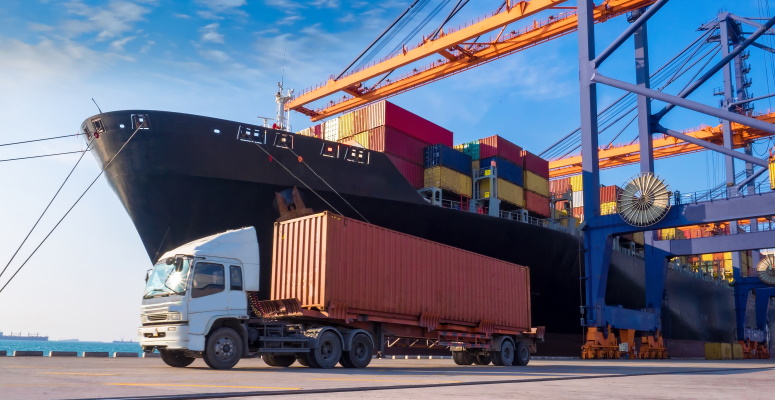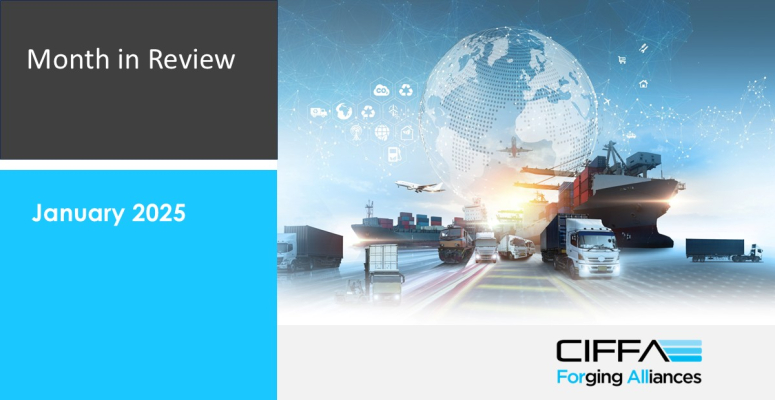
Month in Review – November 2023
Maritime
November 3: Maersk Cutting 10,000 Jobs in Face of ‘Worsening Market Conditions’ – American Shipper
Maersk revealed on November 3 that it is “intensifying” job cuts in light of the “worsening market conditions” in ocean shipping.
“Given the challenging times ahead, we accelerated several cost and cash containment measures,” said Vincent Clerc, CEO of A.P. Moller-Maersk.
“We are in a very uncertain trading environment with significant further downside risk potential – one that could stay with us for quite a while,” Clerc said on a call with analysts.
Maersk began the year with 110,000 global employees. Year to date, it has cut 6,500 jobs, which it had not previously disclosed. It has now decided to cut a further 3,500 jobs, including 2,500 by year-end and 1,000 in 2024. The total reduction – 10,000 layoffs – will reduce the company’s global headcount by 9%.
November 8: MSC and Maersk Unwind Transatlantic Fleets as Rates Hit New Low – The Loadstar
The unravelling of MSC and Maersk’s 2M vessel-sharing alliance (VSA) fleet is continuing ahead of the termination of the east-west trades cooperation, slated for early 2025.
Alphaliner said the 2M partners were “increasingly moving away from services run with a mixed fleet of vessels.”
The consultant said the embattled transatlantic tradelane was the latest 2M route to be split into services operated individually by the partners, thereby making the dissolution of the alliance smoother, and allowing the VSA to be ended by mutual consent earlier than planned.
November 8: $4 Million Lets Shipper Cut to Front of Line at Panama Canal – Transport Topics
A shipper has paid nearly $4 million to jump to the front of the line at the congested Panama Canal waterway, a record high.
Japan’s Eneos Group paid $3.975 million in an auction on November 8 to secure the crossing, bidding documents show. That comes on top of the regular transit fees companies pay, which can be hundreds of thousands of dollars more.
A queue of ships waiting to use the canal has been growing in recent months amid a deep drought. To manage the situation, the canal’s managing authority has announced increasingly drastic restrictions for the depleted thoroughfare. It also lets companies bid on the chance to speed things up and move to the front of the line. Last month, the Panama Canal Authority held 140 auctions, it said. Three of those came in above $1 million.
November 10: Ocean Carriers Are Driving the Rates Race to the Bottom – ‘They’re All at It’ – The Loadstar
Carriers are themselves driving the rates ‘race to the bottom’ they warned would lead to a “dire situation” in 2024 – Maersk singled out as one of the worst offenders.
Announcing the group’s third-quarter flop, the Danish carrier’s CEO Vincent Clerc told investors that, without an uptick on the spot market in the final three months, the coming year would prove difficult for ocean shipping.
His comments, though, received sharp shrift from the wider supply chain, with Rhenus’s head of ocean freight for the Americas, Stephanie Loomis, describing them as “comical.”
She noted on social media: “I find it comical that Clerc is warning of a ‘dire’ situation if rate levels did not improve before the end of the year. These under-market Maersk offers keep ‘showing up’ in co-loaders’ rate sheets, week after week.”
But Maersk is not the only carrier behaving like this: sources claim “they are all at it.”
November 10: ‘Cybersecurity Incident’ Prompts Shutdown of DP World Australia Terminals – The Maritime Executive
DP World, one of the largest terminal operators in Australia, reported on November 10, that the company had suspended all port terminal operations due to what it is calling a “cybersecurity incident.”
“Our teams are working diligently to contain the situation and determine the impact on our systems and data,” DP World Australia said in a statement. The company reports that it is engaging with cybersecurity experts and notifying the relevant authorities while continuing to investigate the scope of the breach.
The work stoppage was reportedly launched for all shoreside operations at the company’s terminals in Sydney, Melbourne, Brisbane and Fremantle after the breach was discovered on that day.
November 13: DP World Hack: Port Operator Gradually Restarting Operations Around Australia After Cyberattack – The Guardian
Australia’s biggest ports operator, which has been the target of a cyberattack, has begun gradually restarting its operations, but key exports could be subject to prolonged delays.
DP World Australia closed its Sydney, Melbourne, Brisbane and Fremantle port operations after detecting the breach on November 10, leaving cargo and containers stuck on the docks.
The company disconnected its internet, which stopped ongoing unauthorized access to its network. This also resulted in key systems linked to its port operations not functioning normally.
November 20: Durban Warns It Could Take 15 Weeks to Clear Backlog as 60 Ships Wait – The Maritime Executive
Port officials in South Africa are reporting it is likely to take until 2024 and possibly till February to clear the current congestion that has built up at the container port in Durban.
Consistently at the bottom of port rankings for efficiency, Durban is facing a crisis, with more than 60 vessels reportedly waiting offshore and importers now saying they will not have expected merchandise in time for Christmas.
November 21: More Surcharges Loom for Shippers as Panama Canal Restrictions Tighten – The Loadstar
French carrier CMA CGM is set to become the first major carrier to apply a new surcharge on shipments transiting the Panama Canal, in response to the ongoing capacity reductions.
The shipping line said the series of reduced capacity measures introduced by the waterway authority this year – and forecast to continue into 2024 – are pushing up its costs.
“The lack of precipitation over the summer has forced the Panama Canal Authority to reduce the number of vessels transiting a day. As a consequence, by 1 January, booking windows for transiting the canal’s neopanamax locks will be reduced by 30%.
“These restrictions, combined with an increase in the canal tariff implemented earlier in the year, are taking a severe toll on CMA CGM’s operations,” it said.
November 21: Global Shipping’s $3.6 Billion Carbon Bill is Six Weeks Away – The Uncontained
Ships sailing to European ports face a combined carbon emissions bill of $3.6 billion next year, the start of a levy that’s almost certainly going to rise as the continent steps up efforts to combat climate change.
The figure is an estimate of the total price of complying with the European Union’s Emissions Trading System from Drewry Shipping Consultants Ltd.
Under the regulation, which takes effect January 1, vessels going into and out of EU ports must pay for their carbon pollution.
The global shipping industry spewed more than a billion tons of CO2 into the atmosphere in 2018 and is almost exclusively powered by oil-derived fuels, which are significantly cheaper than low-carbon alternatives. Folding it into the ETS is part of the EU’s plan to decarbonize the sector to combat climate change.
November 22: More Shipping Lines Set to Plunge into Losses in Q4 – The Loadstar
Ocean carrier operational profits fell below pre-pandemic levels in the third quarter – and results for Q4 are likely to be a whole lot worse.
Alphaliner’s assessment of the reported earnings before interest and tax (EBIT) of the nine largest carriers saw the average operating margin fall to 1.5% in Q3, which was lower than recorded in any of the quarters in 2019.
November 24: Ashcroft Terminal and Vancouver Fraser Port Authority Partner to Increase Supply Chain Resiliency – American Journal of Transportation
Ashcroft Terminal Ltd. and the Vancouver Fraser Port Authority have signed a letter of intent concerning a long-term arrangement for the transportation of Canadian imports and exports. The organizations will work together to invest in, build and operate rail infrastructure at Ashcroft Terminal to reduce congestion within the Port of Vancouver, support capacity growth and enhance resiliency within the critical Asia-Pacific Gateway trade corridor. This partnership is expected to advance the efficient movement of imports and exports in Western Canada and help deliver goods to market faster.
Ashcroft Terminal Ltd. – an inland terminal located approximately 300 kilometres east of Vancouver – will provide infrastructure to supply railcar storage and staging for improved resiliency and cargo fluidity along the Asia-Pacific Gateway Corridor. This will help remove bottlenecks along this major transportation corridor. The parties anticipate the railcar storage program to be operational by fall 2024.
November 24: ‘Dire’ Scenario for Shipping Lines More Likely as Spot Rates Fall Back – American Shipper
There’s a lot at stake for container lines’ 2024 bottom lines in the last few weeks of 2023. If lines can’t push up spot rates very soon, next year’s annual contract rates will reset much lower versus this year’s.
That scenario – which would have a very negative financial effect on liners – looks increasingly likely. Time is running out for a fourth-quarter rebound, and indexes show spot rates falling, not rising.
Shipping lines’ attempts to use general rate increases (GRI) this month to improve their negotiating hand for annual contract resets have failed. They have one last chance in December, but their track record of getting GRIs to stick has been poor.
November 28: The Panama Canal Is So Backed Up Ships Are Rerouting Through the Suez – American Journal of Transportation
A bottleneck at the Panama Canal due to low water levels has prompted shippers to divert to the Suez Canal, the Cape of Good Hope or even through the Strait of Magellan off the tip of South America.
The Panama Canal Authority, which normally handles about 36 ships a day, announced on October 30 that it will gradually reduce the number of vessels to 18 a day by February 1 to conserve water heading into the dry season. Panama had the driest October on record due to a drought caused by the El Niño weather phenomenon, the authority said.
Air
November 10: Flights Get Longer as Airlines Are Forced to Skirt War Zones – American Journal of Transportation
The Middle East has long been a global crossroads for air travel, with hundreds of aircraft bisecting the region every day on long-distance journeys connecting the U.S., Europe and Asia.
Plying those routes has become more challenging, with rising tensions forcing airlines to curtail services as a safety precaution. The war between Israel and Hamas, in a region already studded with hot zones, has added to the complications of flying between east and west.
That’s after Russia’s invasion of Ukraine already added hours to many journeys by shutting down vast airspace to many transnational operators – including the Great Circle routes through Siberia, a popular gateway between the continents.
Each extra hour of flight added $7,227 to the variable cost of a typical widebody journey in 2021, based on Federal Aviation Administration estimates. Expenses such as fuel and labour have only increased since then, said John Gradek, an expert on aviation operations and lecturer at McGill University in Montreal.
November 10: Cargojet to Sell Off New B757 Freighters, Pause 767 Conversions – American Shipper
Cargojet, which operates a nationwide air cargo network in Canada for e-commerce express companies plus international services, is moving more aggressively to cap fleet growth and preserve strong cash flows in response to the continued slowdown in shipping demand.
The airfreight specialist has a surplus of Boeing 757 converted freighters and recently listed four of them for sale. The planes were recently converted and had their engines overhauled.
The move follows an earlier decision not to proceed with converting four 777-300 passenger jets.
November 13: Pricing Index Shows Airfreight Rates Creeping Steadily Upwards – Air Cargo Eye
The August to September uptick on airfreight rates on major Asia-outbound lanes is gradually continuing, pricing analysts say.
Nevertheless, there was little change in the first week of November, according to the latest data from air cargo pricing monitor TAC Index.
The Baltic Air Freight Index (BAI) was overall slightly lower, down by 0.5 percent, in the week to November 6, leaving its year-on-year change at 28.8 percent down – but with the ‘firmer tone’ of peak season generally continuing, a statement says.
Rates on the biggest air cargo routes out of China continued to climb during the week.
November 16: WestJet Cargo and Flexport Collaborate on Airfreight Solutions to Asia – American Journal of Transportation
WestJet Cargo has signed an agreement with Flexport to offer new airfreight solutions for Canadian exports into Asia.
Under the agreement, WestJet Cargo will deliver Canadian cargo to O’Hare International Airport (ORD), where Flexport operates dedicated freighters from the U.S. to key air freight hubs in Asia, including Incheon International Airport (ICN), Shanghai Pudong International Airport (PVG) and Hong Kong International Airport (HKG), effectively expanding the global reach for WestJet Cargo and its customers.
Rail
November 8: CN Announces New Intermodal Service to Port of Gulfport – CN press release
CN has signed a memorandum of understanding (MOU) with the Mississippi State Port Authority at Gulfport and Ports America establishing a new intermodal service. The trial run of the service will launch in the coming weeks.
The goals of the MOU include identification and development of a best-practices vision through productivity improvements for the supply chain, and collaboration in implementing those supply chain improvements to leverage and increase market share.
Trucking
November 3: 70% of Drivers in U.S. Violate Hours-of-Service Regulations Due to Lack of Parking: ATA – Transport Routier (translated from French)
The American Trucking Associations (ATA) and its 50 affiliated organizations are calling on the governors of every state in the U.S. to put truck parking at the top of their infrastructure spending priorities.
In a press release, the ATA said the lack of parking spaces for truckers has been a long-standing concern of the industry, adding that it raises safety issues that affect all road users.
The association also cites a study by the U.S. Department of Transportation, which found that 98% of truck drivers regularly struggle to find a safe place to stop and rest, often forced to park at unsafe or outright illegal sites. That’s 23% more than four years ago.
Even more worrisome, 70% of drivers have been forced to violate federal hours-of-service rules because of these all-too-common situations, the ATA said.
November 8: Truck Drivers Still Eligible for Express Entry After List Removal: IRCC – Today’s Trucking
Transport truck drivers remain eligible for Canada’s Express Entry immigration program for skilled workers, but may find it a bit tougher to secure permanent residence status under changes made by Immigration, Refugees and Citizenship Canada (IRCC).
An IRCC administrative update has removed National Occupational Classification Code 73300 for transport truck drivers from the list of occupations eligible for a Certificate of Qualification (CoQ) – a criterion that helped boost scores in the permanent resident application process.
“It has been determined that transport truck drivers do not have a CoQ-equivalent certification that some other tradespeople have [e.g. carpenters, welders, etc.]. Therefore, IRCC has removed the occupation from this list,” said an IRCC official.
November 14: Heightened Cargo Theft Trends Continue in Q3 – FleetOwner
In a trend that shows no signs of slowing, cargo theft for the third quarter of 2023 increased 59% year-over-year after comparable increases in quarters one and two, according to a report from freight security network CargoNet.
CargoNet recorded 692 instances of theft across the U.S. and Canada last quarter, largely as part of a continuing trend of shipment misdirection attacks, a type of fraud in which thieves use stolen motor carrier or broker identities to obtain freight. In total, thieves stole over $31.1 million in shipments in the third quarter of 2023.
November 15: FMCSA Issues Final Rule for Brokers, Forwarders – Trucking Dive
The Federal Motor Carrier Safety Administration released details on a final rule to help ensure brokers and freight forwarders have sufficient money posted to compensate carriers.
The rule sets parameters on what forms of security would be eligible and ineligible. Brokers and freight forwarders with financial security falling below $75,000 could have their operating authority suspended.
“This rule will result in benefits to motor carriers,” the agency said, noting it’s seeking to address how some brokers withhold payments to motor carriers. Provisions of the rule go into effect on January 16, 2025 and a year later.
November 30: Congestion in U.S. Cost Truckers Nearly $100 Billion in 2021 – DC Velocity
If you’ve been thinking highways are more crowded these days, you’re right. After dropping during the pandemic years, traffic congestion has returned with a vengeance, creating snarls and delays throughout the U.S.
And those delays are costing the trucking industry a bundle. According to the American Transportation Research Institute (ATRI), the nonprofit research arm of the American Trucking Associations (ATA), traffic congestion on U.S. highways added $94.6 billion in costs to the trucking industry in 2021. That represents the highest level in six years, according to the institute’s latest “Cost of Congestion” study.



